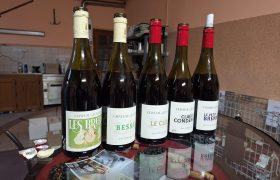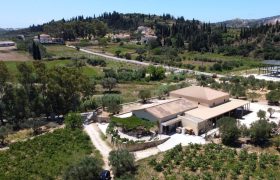Sip and Celebrate: 3 Sparkling Greek Wines to Lift Your Spirits
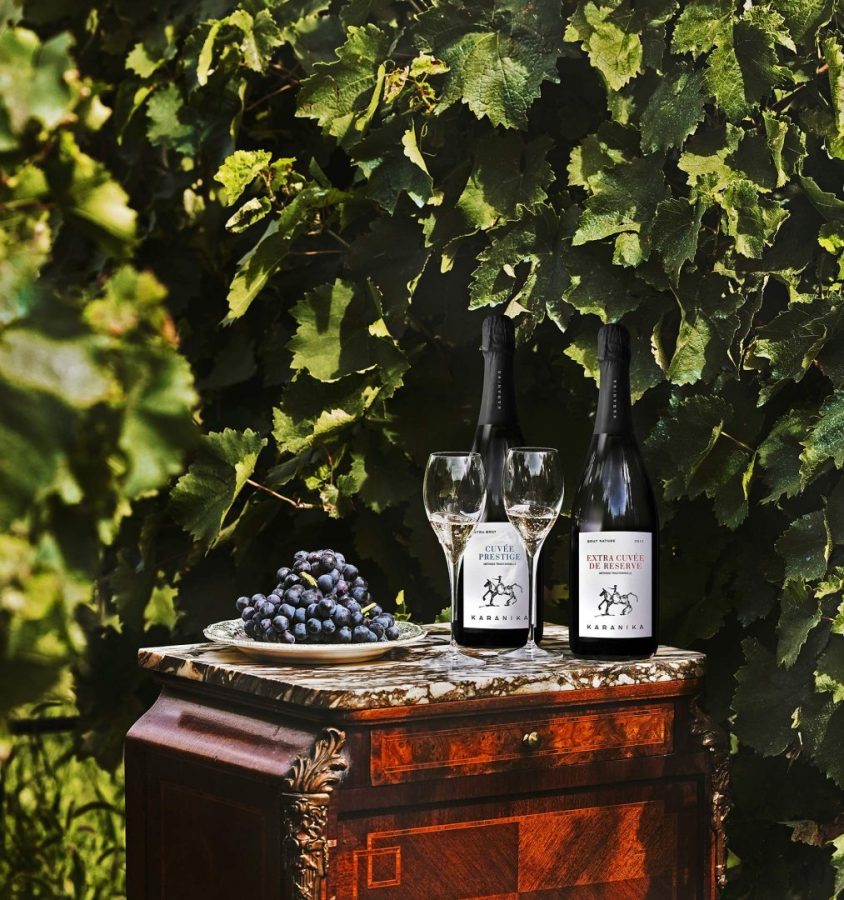
Tom Hall finds new reasons to embrace effervescence, raising a glass to 2025’s existential complexities with three of Greece’s freshest sparkling wines worth celebrating.
Apparently champagne shipments fell by nearly 10% in 2024 and that was before all this confusing tariff malarkey which will surely put le chat amongst le pigeon. Other than painfully obvious factors like global economic uncertainty (a lot more of it) and customer confidence (a lot less of it), one of the reasons given for the decline in sales was a “general sense of gloom” leading to a lack of desire to celebrate. Now as I see it, there are two things that can be done in this sad situation, if like me, you believe that celebration is fundamental to mental wellbeing. Firstly, find easier ways to celebrate the traditional moments and secondly, to find new things to celebrate. So I would like to make a very brief case for the universal appeal of sparkling wine, of which champagne is only the most showy of a large field, as a moment of pleasure that can be tapped into more often.
- Coco Chanel
- Oscar Wilde
- Napoleon Bonaparte
The question is when. Now I’m very much of a mind with Coco Chanel when she said “I only drink champagne on two occasions, when I’m in love and when I’m not.” Or even the famous English basher and right-hand-hider, Napoleon Bonaparte when he said that “in victory you deserve champagne: in defeat you need it.” Or if you’re still groping for excuses to have a sip you can turn to the acerbic wit of Irish poet, playwright and wallpaper-hater, Oscar Wilde, to shame you into popping a cork. If the statement “only the unimaginative can fail to find a reason for drinking Champagne” doesn’t make you feel targeted then you’re more secure in your surfeit, or even dearth, of imagination than me.
It’s not hard to see how champagne became associated with luxury and celebration. From a commercial point of view it was time-consuming and difficult to make and refined and scarce. It was also associated with a country that was already globally famous for its palate and its pantry making it desirable as a signifier of wealth and sophistication. From a psychological perspective, from the pop of the cork to the first sip and beyond, it is both metaphorically and literally exciting. The estimated 1 million bubbles that are formed and consumed in each and every glass are a multisensory firework display just for us.
And then there are the supposedly freeing properties that are unique to the bottle with bubbles in it. From Marilyn Monroe’s instantaneous inebriation in Some Like It Hot to Grace Kelly’s magnificent pre-wedding binge in High Society, soundtracked with Bing and Fred singing What a Swell Party while consuming what is undoubtedly supposed to reference Mumm, a glass of fizz loosens the tongue and opens the heart. Even the famously dour left got in on the action with the Champagne socialists of the UK’s New Labour. A badge that was worn with pride having been created as a stinging insult. The wisdom of the internet suggests that marriages, births and new jobs are some of the most common champagne moments but with all of those becoming increasingly rare when can we drink a glass? Whenever and wherever budget allows, I would say.
 Geographically, culturally, and legally located around Reims and the Épernay Valley in Northern France, champagne was supposedly invented by a Benedictine monk Dom (Pierre) Pérignon whose far sighted commercial instincts currently sees his magical grape juice partnered with the likes of Lady Gaga. We are told that Dom Pérignon declaimed “Come quickly, I’m drinking the stars” on first trying his newly fizzy wine which is just lovely, but also not true. The quote was apparently invented in a 19th century marketing campaign which just goes to show how ahead of the advertising game champagne was, and also the kind of shamelessness consuming a lot of it promotes. That all said, an excellent way to irritate a Frenchman, should anyone ever want to do something so ill-mannered and inelegant, is to mention the paper that the English scientist, Christopher Merritt delivered to the British Royal Society in 1662 (35 years before Dom P’s eureka moment) describing how to add sugar to a finished wine to create a secondary fermentation in the bottle. A fun dinner party game if the conversation is at a lull. Don’t blame me. After years of regulation, convention and profit in the Champagne region accusations of laurel-sitting have been leveled at some of the Les Grande Marques, particularly in their entry level offerings with more thought given to packaging and partnerships than the contents of the bottle. There has been a revolution of a kind as grower champagne makers have come to the fore, focusing on expression of grape and terroir rather than consistency or “brand equity”. Several Athenian wine shops carry an excellent selection with Mr. Vertigo in particular selling grower champagnes by Benoît Lahaye and Alexandre Fillane and Larmandier-Bernier, any of whose wines provide excellent value for money and serious wine-lover kudo points.
Geographically, culturally, and legally located around Reims and the Épernay Valley in Northern France, champagne was supposedly invented by a Benedictine monk Dom (Pierre) Pérignon whose far sighted commercial instincts currently sees his magical grape juice partnered with the likes of Lady Gaga. We are told that Dom Pérignon declaimed “Come quickly, I’m drinking the stars” on first trying his newly fizzy wine which is just lovely, but also not true. The quote was apparently invented in a 19th century marketing campaign which just goes to show how ahead of the advertising game champagne was, and also the kind of shamelessness consuming a lot of it promotes. That all said, an excellent way to irritate a Frenchman, should anyone ever want to do something so ill-mannered and inelegant, is to mention the paper that the English scientist, Christopher Merritt delivered to the British Royal Society in 1662 (35 years before Dom P’s eureka moment) describing how to add sugar to a finished wine to create a secondary fermentation in the bottle. A fun dinner party game if the conversation is at a lull. Don’t blame me. After years of regulation, convention and profit in the Champagne region accusations of laurel-sitting have been leveled at some of the Les Grande Marques, particularly in their entry level offerings with more thought given to packaging and partnerships than the contents of the bottle. There has been a revolution of a kind as grower champagne makers have come to the fore, focusing on expression of grape and terroir rather than consistency or “brand equity”. Several Athenian wine shops carry an excellent selection with Mr. Vertigo in particular selling grower champagnes by Benoît Lahaye and Alexandre Fillane and Larmandier-Bernier, any of whose wines provide excellent value for money and serious wine-lover kudo points.
With that in mind, I’m here to say that champagne isn’t the only sparkling solution and there are many mousses out there to tickle one’s palate at a range of price points. English sparkling wine has been an overnight success for some decades now and there are English vintages coming on the market which give the French a proper run for their money although they are reaching a comparative cost as well now. That is a story for another day and another dinner party.
Given we are in Greece and given the millennia long tradition of wine making along with the general let’s-have-a-go attitude of the Greeks, let’s look at the excellent selection of Greek sparkling wine that is on offer. And with Greek sparkling wine tending to be significantly more affordable than French, or even English, sparkling wine, it means you can have your little moment of celebration more often.
The quality and range of Greek sparkling wine is in itself a reason to celebrate. What follows are wines from three leading producers that are made using the traditional method invented by either a French monk or English scientist.
Amalia Brut, Domaine Tselepos, Moschofilero
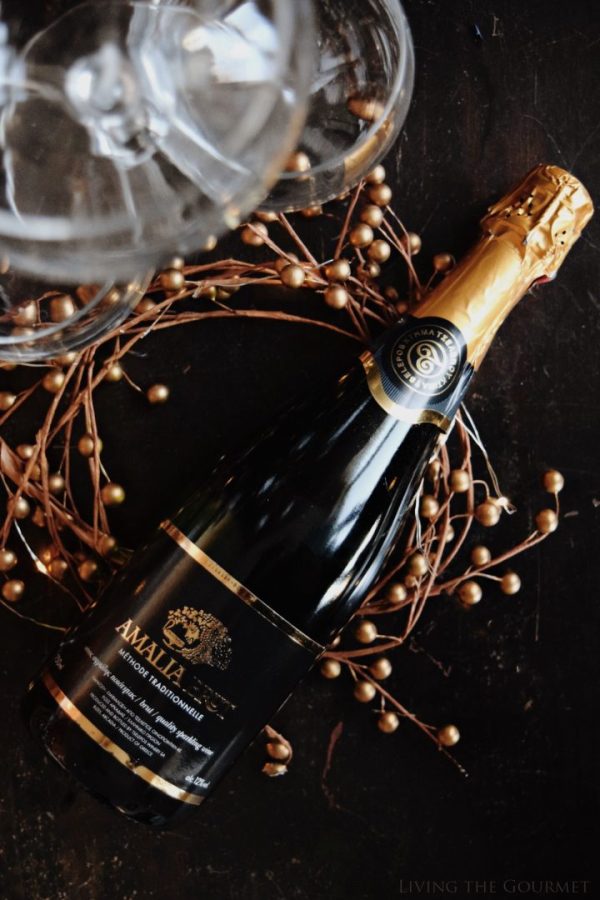 This is 100% Moschofilero and proudly proclaims on the label that it is made using the “Traditional Method”. This is a heartfelt homage to the French stuff and done with admiration for both that great nation and a pride in Greek produce and expertise. It is produced by famed Moschofilero whisperer, Yiannis Tselepos, in its natural heartland of Mantinia. This is an elegant sparkling wine, especially when it can often be found in shops, if not restaurants, for under €20. With light lemon-green color and fine bubbles, it has aromas of citrus flowers and honey, with a touch of brioche and rose notes. The mouthfeel is characterized by notes of yeast and toast complemented by crispy acidity. It compliments food well and would be an excellent pairing with an Anthotyro cheese as a chic aperitif.
This is 100% Moschofilero and proudly proclaims on the label that it is made using the “Traditional Method”. This is a heartfelt homage to the French stuff and done with admiration for both that great nation and a pride in Greek produce and expertise. It is produced by famed Moschofilero whisperer, Yiannis Tselepos, in its natural heartland of Mantinia. This is an elegant sparkling wine, especially when it can often be found in shops, if not restaurants, for under €20. With light lemon-green color and fine bubbles, it has aromas of citrus flowers and honey, with a touch of brioche and rose notes. The mouthfeel is characterized by notes of yeast and toast complemented by crispy acidity. It compliments food well and would be an excellent pairing with an Anthotyro cheese as a chic aperitif.
Domaine Karanika, Brut Cuvee Speciale, Xinomavro, Assyrtiko
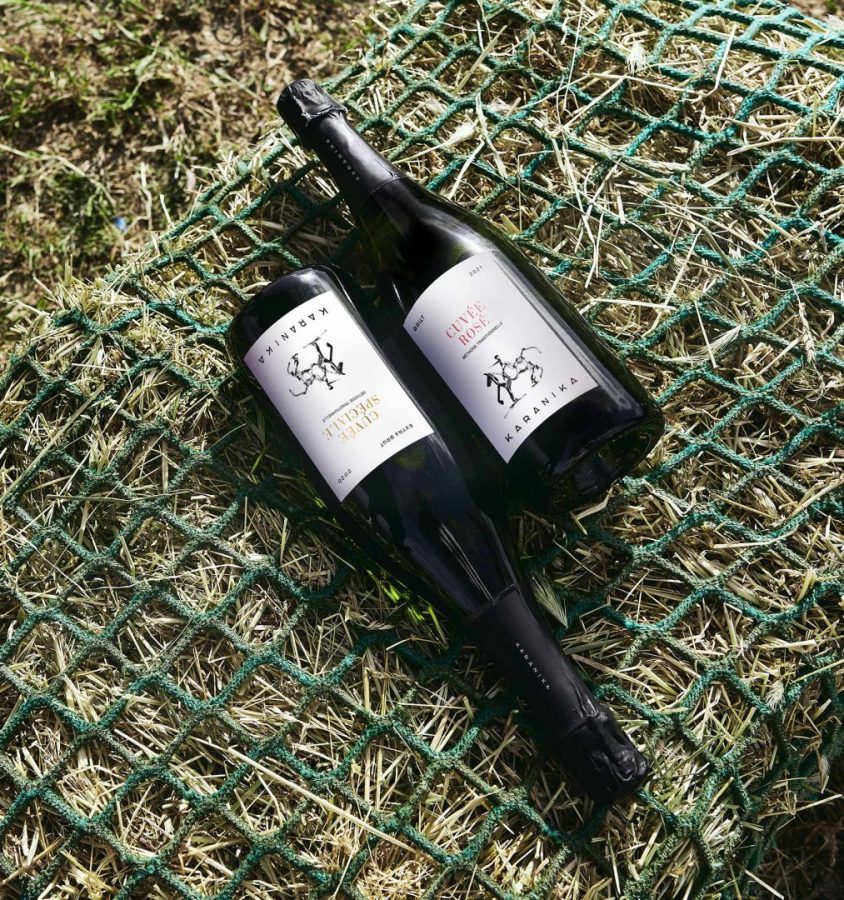 Often held up as the leader of the Greek producers of traditional method wines, Domaine Karanika is located in the North-Western reaches of Greece not far from the North Macedonian border in a town called Amyndeon (named for Alexander the Great’s grandfather Amyntas III). The area’s geographical positioning, elevated at 700 meters above sea level, being in the lee of Mount Vermio and enjoying the cooling effects of large local lakes, make it perfect to age grapes slowly on the vine as loved by sparkling whites with freshness, acidity and the ability to age. The majority of the wine is made with Xinomavro, which I’ve been told by people who know not to call the pinot noir of Northern Greece although there would be an argument for an amatuer like me in doing so. Fulfilling the same job and with similar characteristics as pinot noir would in Champagne (didn’t say it), this wine has a pleasing yeasty nose with fresh fruits and white flowers. Limes and pear follow and build the impression of an excellent wine with satisfying complexity and a long finish. A bottle of this with a simply roasted chicken and a zesty green salad would be a lovely way to spend an hour or so.
Often held up as the leader of the Greek producers of traditional method wines, Domaine Karanika is located in the North-Western reaches of Greece not far from the North Macedonian border in a town called Amyndeon (named for Alexander the Great’s grandfather Amyntas III). The area’s geographical positioning, elevated at 700 meters above sea level, being in the lee of Mount Vermio and enjoying the cooling effects of large local lakes, make it perfect to age grapes slowly on the vine as loved by sparkling whites with freshness, acidity and the ability to age. The majority of the wine is made with Xinomavro, which I’ve been told by people who know not to call the pinot noir of Northern Greece although there would be an argument for an amatuer like me in doing so. Fulfilling the same job and with similar characteristics as pinot noir would in Champagne (didn’t say it), this wine has a pleasing yeasty nose with fresh fruits and white flowers. Limes and pear follow and build the impression of an excellent wine with satisfying complexity and a long finish. A bottle of this with a simply roasted chicken and a zesty green salad would be a lovely way to spend an hour or so.
Milia Riza, The Experiential Chardonnay x Pinot Noir, Extra Brut
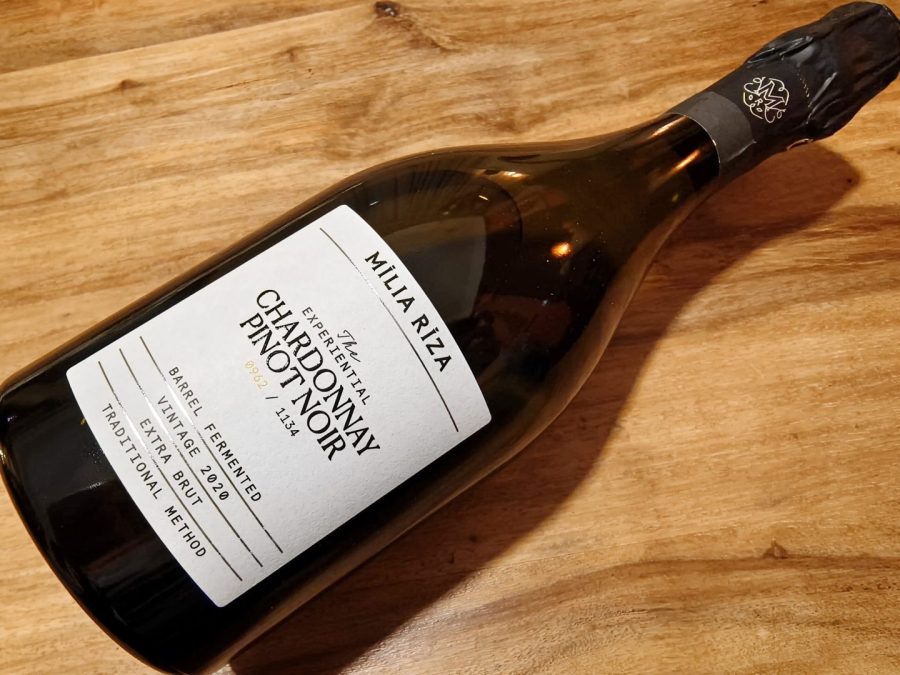 A relative newcomer to the Hellenic fizz scene, Milia Riza is proudly experimental. Even the name is playful and establishes the ambitions of the business. Milia is from “familia” which ties together the founders’ Greek, Italian, Portuguese and Brazilian roots. And Riza means “roots” for multiple, obvious reasons. Isn’t language fun? Also amongst their roots is genuine Greek wine aristocracy, as founder Nancy Mazou is the granddaughter of Thanassis Papaioannou who was at the forefront of the Nemean wine revolution. Starting with vineyards in the hot wine country of Nemea, the first test the winemakers made was whether they could make sparkling wine in that climate at all. The biggest swing they took became the “Experiential” range. This is the harmony of thought and practice as the founders test a theory with an open mind to the outcome. In this case, it was to take a hot wine climate and apply cold climate techniques to traditional grapes. And it has worked beautifully, producing a complex, full-bodied sparkling wine with remarkable freshness and acidity. This wine works beautifully on its own, but really sings when paired with food. One of the founders, Stefano, recently paired it with roast lamb and raved about the contrast of the fatter lamb and the fresh, but full bodied wine. Given how much I loved the wine on its own, I can’t wait to try the combination.
A relative newcomer to the Hellenic fizz scene, Milia Riza is proudly experimental. Even the name is playful and establishes the ambitions of the business. Milia is from “familia” which ties together the founders’ Greek, Italian, Portuguese and Brazilian roots. And Riza means “roots” for multiple, obvious reasons. Isn’t language fun? Also amongst their roots is genuine Greek wine aristocracy, as founder Nancy Mazou is the granddaughter of Thanassis Papaioannou who was at the forefront of the Nemean wine revolution. Starting with vineyards in the hot wine country of Nemea, the first test the winemakers made was whether they could make sparkling wine in that climate at all. The biggest swing they took became the “Experiential” range. This is the harmony of thought and practice as the founders test a theory with an open mind to the outcome. In this case, it was to take a hot wine climate and apply cold climate techniques to traditional grapes. And it has worked beautifully, producing a complex, full-bodied sparkling wine with remarkable freshness and acidity. This wine works beautifully on its own, but really sings when paired with food. One of the founders, Stefano, recently paired it with roast lamb and raved about the contrast of the fatter lamb and the fresh, but full bodied wine. Given how much I loved the wine on its own, I can’t wait to try the combination.





